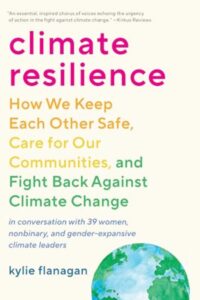Book Info

Topics: Nonfiction, Feminism, Environmental Activism, Climate Change
LibraryThing: https://www.librarything.com/work/book/291465827
Acquired from: Little Free Library, Ann Arbor, Michigan, USA [see visit log]
Started reading: August 9, 2025
Finished reading: August 13, 2025 (DNF’d)
Reading Updates
Page 0: Picked this book to read next because it’s the heaviest— I don’t want to have to worry about trying to pack it and take it with me!
It’s a relatively new book (published 2023) and is basically a collection of interviews with climate activists.
Came with a bookmark from the Ann Arbor District Library (Seed Sampler, which promotes their seed library!). It’s a really nice bookmark and I’m probably gonna keep it for my collection.
Page 2: (introduction)
I began with these questions: What might climate solutions look like that simultaneously strive for a radical reduction in greenhouse gas emissions, adaptation to changing conditions, and justice for those most impacted by climate change and structural oppression? Amid a sea of siloed and shallow so-called climate solutions focused on scale, speed, and investor return, which solutions are most rooted in relationship, compassion, humility, trust, and long-term thinking? What does meaningful climate action and collective care look like from folks who have been here before, who have devised loving and innovative ways to meet the needs of their community members in times of crisis and shortage and oppression? This book emerged from those conversations.
Page 8: (introduction) I like the scope of this book and how thoughtful the author is about everything but ALSO the language/tone is very…”white woman feminist” mixed with Twitter era over-explaining. It’s like she’s bracing herself for impact before the book even starts, and using activist lingo to prove she’s part of the community so the impact isn’t as bad. Something like that.
Page 17: (Ruth Miller) “I am existentially exhausted from the circumstances of our world.” Yup!!!
Page 32: (Morgan Curtis)
Stopping the harm means divesting from those systems to the very best that we can. Knowing that we are individual participants in a system that is much bigger than us, we can still make choices to participate less in the extraction and domination inherent in almost all our economic choices right now.
Her examples are: divesting from the stock market, not having private property, living simply on $20k/year.
Page 69: (Cate Mingoya-LaFortune) She says to stop telling people to get an education and leave their communities (that their communities are the problem and not systemic issues affecting the communities) and instead get educated and uplift their communities. Simple, but it’s true!
Page 70-ish: Okay, I’m not excited to read this book and I don’t want to waste time pretending I’m going to pick it up again, so I’m going to drop it off at another Little Free Library for someone else to enjoy.
Word List
- Decarbonize: “To reduce or replace fossil fuels by renewable energy in energy production and distribution systems.”
- Solidarity economy: “…a wide range of economic activities that aim to prioritize social profitability instead of purely financial profits.”
Book Wishlist
📚 All We Can Save: Truth, Courage, and Solutions for the Climate Crisis by Dr. Ayana Elizabeth Johnson and Dr. Katharine Wilkinson
See also: Books Read (2025) / All Reading Logs

One thought on “📖 reading log: climate resilience by kylie flanagan”